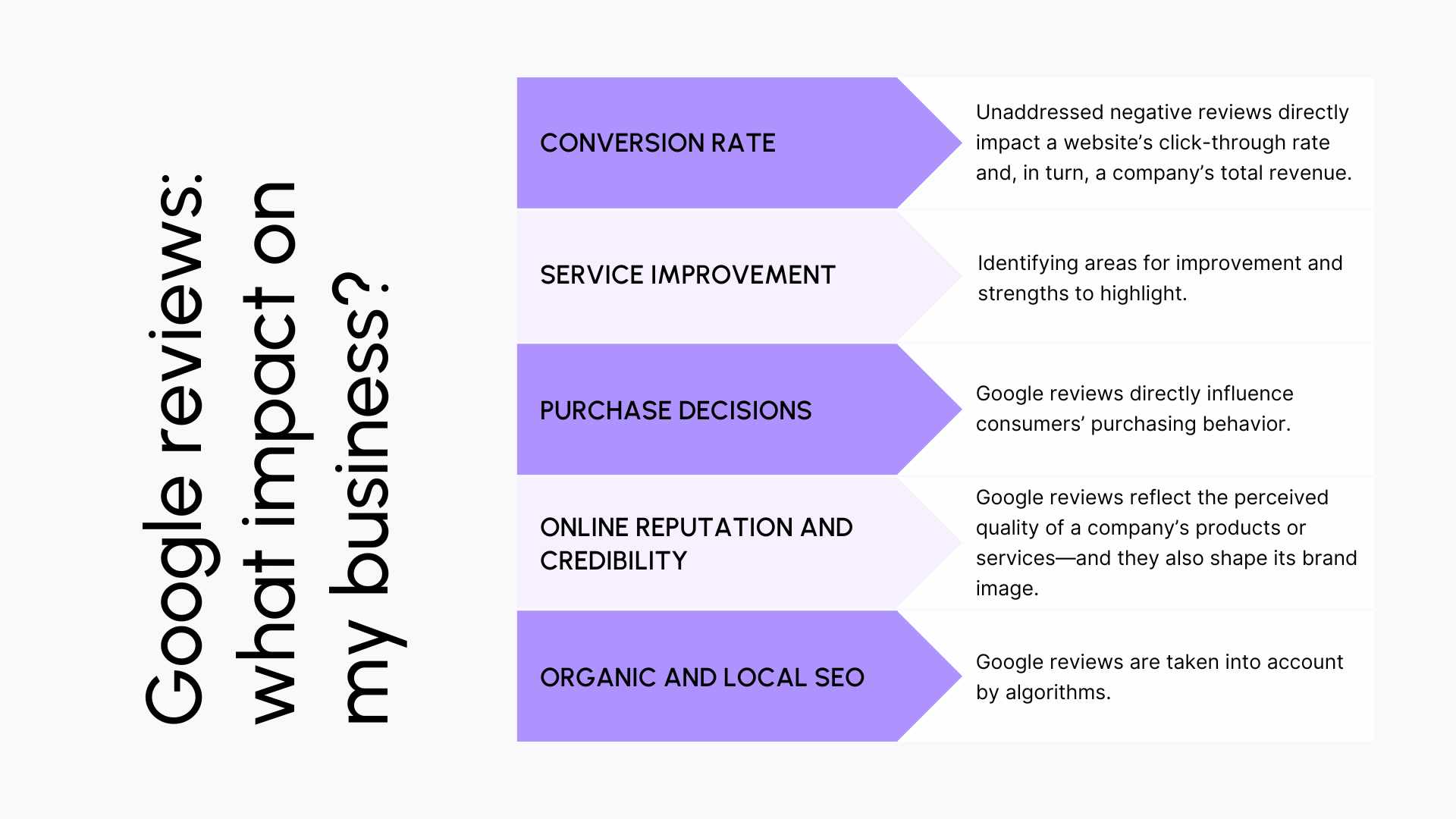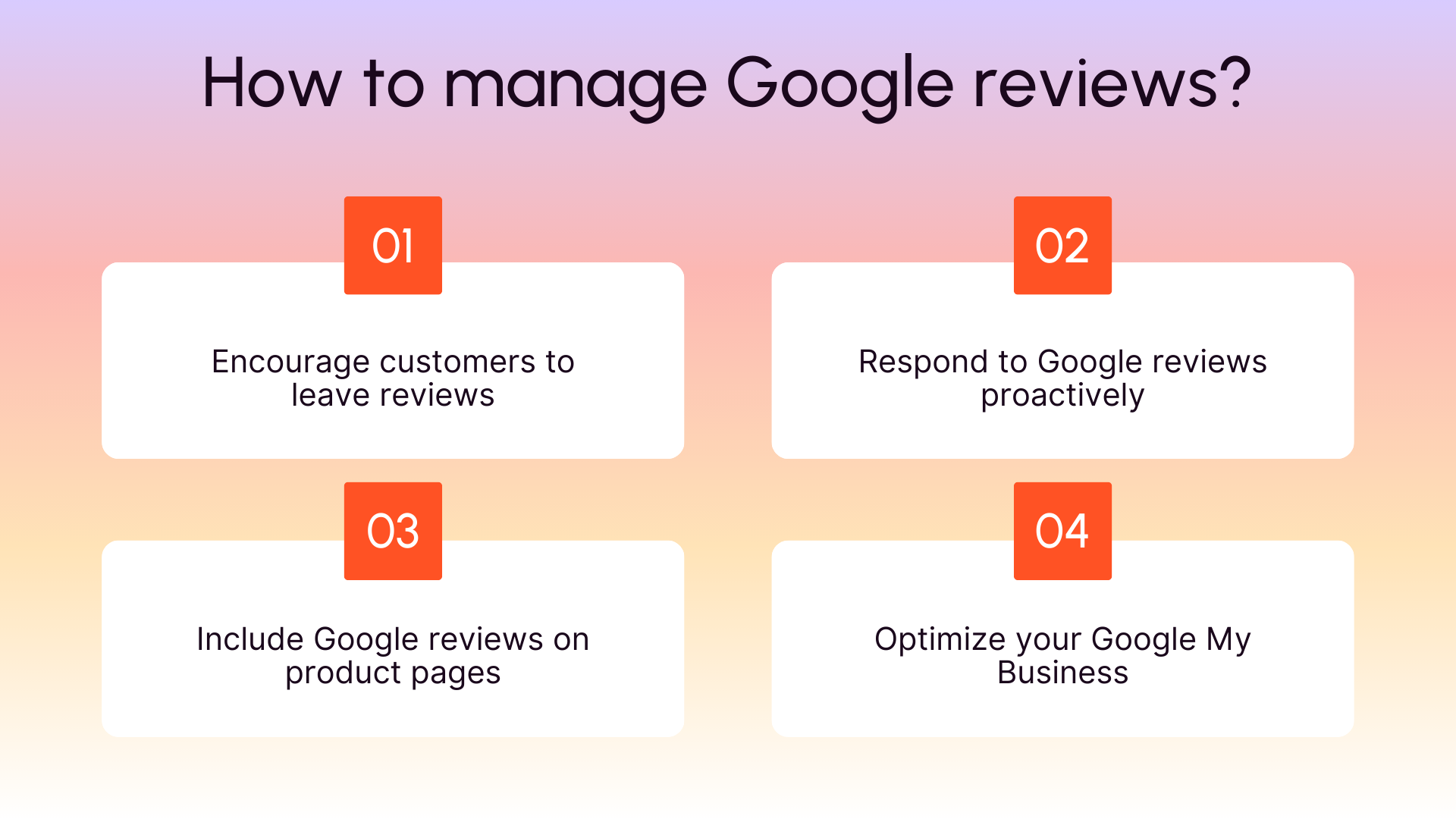Why are Google reviews important?
In today's digital landscape, where first impressions are often formed online, Google reviews play an undeniable role in how consumers perceive businesses. These customer feedback pieces, visible to a broad audience on Google, significantly influence purchasing decisions, credibility, and even customer loyalty for your brand and website. In this article, we'll explore in detail what Google reviews are, how they're generated and managed through Google My Business, and most importantly, their substantial impact on business performance. We'll cover best practices for optimizing this resource and turning it into a growth lever and reputation management tool. Let's dive in!
Expert opinion
Google reviews play a crucial role in your online reputation and business credibility, and shouldn't be neglected. An accumulation of negative reviews, combined with a lack of response on your part, can negatively impact your traffic and sales. Moreover, these reviews can permanently damage your brand image. It's therefore essential to take them into account and manage them carefully.
What Are Google Reviews?
What Is a Google Review?
A Google review is an evaluation left by a user on a business's Google listing for a company, product, or service. This evaluation typically appears as a rating, usually ranging from one to five stars, and a text comment where the user shares their experience. These reviews are public and accessible to everyone via the business's Google page.
Actively managing these reviews, whether positive or negative, is crucial because they influence the business's average rating and can significantly impact revenue.
How Can Users Leave Reviews?
To leave a Google review, users must follow a few simple but essential steps.
First, they need to have a Google account. Once logged in, users can search for the establishment via Google Maps or Google's search bar.
On the establishment's page, a "Write a review" option is typically visible. By clicking on it, users can assign a rating and write a comment detailing their experience.
Steps to publish a review:
- Login: Make sure you're connected to your Google account.
- Search: Find the establishment or service you want to evaluate.
- Writing: Click on the option to write a review, assign a rating, and share your experience.
It's recommended to provide objective and constructive comments. Personal information shouldn't be disclosed in the review content to maintain everyone's confidentiality and security.
The Role of Google My Business in Review Management
Google My Business (GMB) proves to be an essential tool for businesses wanting to master their online review management. By facilitating the publication and moderation of comments, GMB, which is essentially your Google listing, allows businesses to respond quickly and effectively to customer feedback.
This interaction isn't limited to managing positive reviews; it also involves a strategic and meticulous approach to addressing negative criticism, which can be converted into opportunities for service or product improvement.
One of the main advantages of Google My Business lies in its ability to centralize reviews on a visible and accessible platform, thereby strengthening the business's organic search presence on Google. Increased visibility on Google Maps and in local search results constitutes a major asset for attracting new customers.
How Do Google Reviews Impact My Business?
Influence on Purchase Decisions
Google reviews directly influence consumer buying behaviors. A majority of potential customers consult online evaluations before finalizing their purchases. Here are some key points of their influence:
- Social validation: Reviews act as social proof, where consumers feel more confident in their choices if others have shared positive experiences.
- Behavioral influence: You know it—when faced with positive reviews, customers are often willing to spend more or travel further to benefit from the highest-rated services or products. Like everyone else, really.
- Sales impact: Positive feedback can increase sales by giving the business a favorable image, while negative reviews can deter purchases.
Businesses must therefore be proactive in managing their reviews to positively influence their clientele's purchasing decisions.
Online Reputation and Credibility with Customer Reviews
In terms of online reputation, customer reviews are of paramount importance. They are both a reflection of the perceived quality of your products or services and a key factor in your credibility in consumers' eyes. More specifically, reviews act as a barometer of customer satisfaction. We also speak of informal recommendations when it comes to these customer reviews.
Numerous positive Google reviews contribute to strengthening customer trust. This foundation of trust is essential for attracting new customers and retaining existing ones.
However, customer review management isn't limited to collecting stars. It's essential to respond to reviews, whether positive or negative. An appropriate response to a negative review can even strengthen your credibility by demonstrating your commitment to improving the customer experience.
- Actively manage reviews: This means responding quickly and appropriately to all reviews, whether positive or negative. This interaction can strengthen the customer relationship and improve your business's perception and brand image.
- Encourage positive reviews: You can use different techniques to encourage your customers to leave positive reviews. For example, you could offer a small gift or discount in exchange for a review. This is part of customer follow-up methods.
- Constantly monitor reviews: Use monitoring tools to track reviews left on Google and other review platforms. This will allow you to react quickly and appropriately.
In summary, customer reviews are a valuable tool for strengthening your online reputation and credibility. Use them to your advantage to develop your business.
How Negative Reviews Can Affect a Business
Negative Google reviews can seriously compromise a business's efforts to acquire new customers. When a potential customer encounters unfavorable comments during their search, they can quickly be discouraged from making a purchase or using the proposed service. Here are some specific impacts of negative reviews:
- Decreased confidence: Consumers tend to rely on evaluations to judge a business's credibility. Negative comments can therefore erode this essential trust.
- Impact on conversion rates: A low average rating can decrease the conversion rate of visitors to customers, so you'll see the difference in your revenue.
To counter these negative effects, it's important to respond constructively to criticism, thereby implementing improvements based on customer feedback.
Impact of Google Reviews on Organic and Local SEO
Google Reviews are a powerful mechanism that directly impacts a business's organic and local search rankings. Indeed, these evaluations are taken into account by Google's algorithms to determine business positioning in search results.
An abundance of positive reviews can improve a business's positioning in local search results, which is crucial since good visibility increases user click-through rates.
Reviews also influence SEO in several ways:
- Frequency and recent reviews: Google values recent content, which means regularly updated reviews can help maintain or improve local SEO.
- Keywords in reviews: Customer comments can contain relevant keywords that help improve ranking for specific terms.
- Engagement: High interaction with reviews, namely responses to comments, can signal to Google that the business is active and relevant, which can also favor better positioning on search engines.
Effectively managing Google Reviews is therefore essential not only for online reputation but also for optimizing internet visibility and attracting more traffic to the business website.
Improving Your Service Through Google Reviews
Google review feedback constitutes a valuable tool for continuous improvement of a business's services. By systematically integrating this feedback into their strategy, businesses can identify areas for improvement and strengths to highlight.
Each review, whether positive or negative, should be treated as an improvement opportunity.
For example, because of a comment about wait time, this can encourage a business to review its checkout process or optimize queue management. In the case of e-commerce, a review left on a product page or website can provide information about product or service effectiveness feedback, and thus take note.
These adjustments, based on customer reviews, allow not only to meet specific needs but also to refine the overall experience offered, thereby increasing customer loyalty and strengthening the business's online reputation.

How to Manage Google Reviews? Best Practices
Encouraging Customers to Leave Reviews
To encourage your customers to leave reviews, start by integrating a satisfaction survey into your sales or service process. This survey should be short, relevant, and easy to complete, whether online or on paper.
We say survey, but this can also be sending an email with customer video review creation using tools like Video Ask, which will allow you to collect an attractive video review.
For physical stores, adding a QR code on receipts or in physical locations can simplify this process: customers will only have to scan the code to directly access the review writing platform.
Using social media to encourage experience sharing is also an effective strategy. Offer challenges or contests where customers can win rewards in exchange for a detailed review of their experiences. For example, offering a small discount or free product during the next visit can motivate customers to participate actively.
For these methods to be effective, make sure to clearly communicate to your customers the importance of their feedback and thank them for their time. A small word of gratitude can greatly influence the customer's willingness to share their experience.
Responding to Google Reviews
Responding effectively to Google reviews is an essential practice for any business concerned about its online image. Here are some tips for managing these valuable interactions:
- Response speed: Customers appreciate a quick reaction. Strive to respond to reviews within 24 to 48 hours. This shows that you're attentive and value your customers' feedback.
- Response personalization: Avoid generic responses. Adapt your message based on the review content to show that you've read and considered the customer's specific comments.
- Managing negative reviews: When faced with a negative review, remain professional and courteous. Offer to resolve the problem privately, which can transform a negative experience into an opportunity to demonstrate your commitment to customer satisfaction.
- Highlighting positive reviews: When you receive a positive review, thank the customer for their feedback and encourage them to visit your establishment again. This can strengthen trust and encourage other customers to also share their positive experiences.
By adopting these practices, you not only strengthen your online reputation but also build a lasting trust relationship with your customers.
Integrating Google Reviews into Product Pages
For e-commerce sites, it's important to remember the significance of reviews and their integration into product pages, which can be strategically designed to benefit from their advantages. Here are some practical tips for effective integration:
- Review positioning: Place reviews visibly on your product pages. Typically, they can be located near star ratings or under the product description, where visitors are likely to look for them.
- Easy access: Ensure reviews are easily accessible without requiring numerous clicks. A direct link from the main product page can encourage customers to read and leave reviews.
- Review filtering: Offer the ability to filter reviews by rating, date, or relevance. This helps consumers quickly find the information most useful to them.
By applying these methods, reviews integrated into your product pages can become a powerful persuasion tool, increasing trust and ultimately conversions. Create mockups or audit your site if it can help you, and see how to effectively use Google reviews.
Optimizing Your Google My Business to Manage Google Reviews
To optimize your Google My Business profile for review management, it's essential to ensure the completeness and accuracy of your business information. Make sure your address, opening hours, and contact details are always up to date, as these details facilitate review publication by satisfied customers.
Integrating reviews into your communication strategy: Use positive reviews as testimonials on your website or in your advertising campaigns. This can increase potential consumers' trust and encourage more customers to leave their own reviews.
Regular review monitoring: Establish a routine to check new reviews daily. This will allow you to respond quickly and show your customers that their opinion is valued.
Using Google My Business analytics tools: Take advantage of the statistics provided to better understand review trends, identify peak activity periods, and adjust your strategies accordingly.
By implementing these practices, you'll optimize your use of Google My Business for effective review management, thereby strengthening your online reputation and increasing your visibility on the search engine.

Conclusion, in Google review management, an active approach is essential to harness their full potential. Customer feedback, whether positive or negative, is a goldmine of information that, if used wisely, can be transformed into opportunities for your business.
Regular monitoring and quick response to reviews show that the business is engaged and attentive to its customers, which can considerably improve brand image and consumer loyalty. Furthermore, integrating this positive review collection into marketing and digital communication strategies amplifies their positive effect by providing social proof of your services or products' quality.
By making reviews an integral part of your communication strategy, you can not only improve your visibility but also build a relationship of trust and transparency with your customers—key elements for a thriving business in the digital age.
Publishing Google Reviews: Key Takeaways
How to Give a Google Review?
To give a Google review, the process is simple. Once you're connected to your Google account, search for the business or location you want to comment on via Google Maps or Google's search bar. On the establishment's page, you'll generally see a 'Write a review' option. By clicking on it, you can assign a one to five-star rating and write a comment. Once your review is written, click 'Publish' to share it. Your comment will then appear on the establishment's page, contributing to its overall rating.
How to Find the Author of a Google Review?
To identify the author of a Google review, it's helpful to consult their public profile by clicking on their name, if available, which can reveal additional information about their publishing activities. Analyzing the review content can also provide clues about the author's identity, especially if the review contains specific details.
How to View the Most Recent Google Reviews?
To view the most recent Google reviews of a business or service, open Google Maps or Google search and type the name of the establishment concerned. Once on the establishment's page, you can see reviews under the specific section. To filter and display only the most recent reviews, you can use the sorting option generally available above the comments. Select "Most recent" to reclassify reviews starting with the most recently published.







